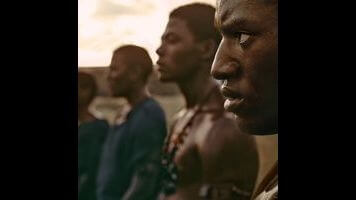History Channel’s Roots remake is a worthy, if familiar, journey

It’s to the credit of History Channel’s reimagining of Alex Haley’s Roots that the most pointed criticism that can be made of it stems from general reboot fatigue. And that fatigue is justified. Must everything old be new again? Especially in the case of Roots, which in its original 1977 miniseries form shattered television viewership records, dominated the Emmys, and illuminated the nation about the history and generational toll of the transatlantic slave trade. If ever there was a case for leaving well enough alone, Roots should be it. But History’s new vision of Roots justifies its existence almost immediately, reinforcing its worthiness through amazing performances and a tweaked narrative that puts more focus on the interior lives of the slaves.
Laurence Fishburne plays Alex Haley as he tells, in stentorian voiceover, the tale of Kunta Kinte (Malachi Kirby), a young man coming of age in Juffure, a pastoral Gambian village that would be idyllic if not for the tribal conflict. Kunta is an up-and-coming Mandinka warrior cut from the same cloth as every renegade hotshot from an ’80s action comedy. He’s a headstrong maverick, determined to think for himself in situations where harmony should take precedent over independence. That’s why it’s all the more difficult for Kunta to adapt when he’s rounded up by greedy tribal lords and sold into slavery. The indignity multiplies as Kunta comes to realize this slavery isn’t like the slavery he was used to back home, with limited terms of servitude, an ability to buy your way out of bondage, and no separation of family units.
The strength in the retelling of Kunta’s story comes in its earliest moments, which take more time to establish Kunta’s life in Juffure than did the original project. Part one, beautifully directed by Phillip Noyce, gives Juffure a sense of history and place that makes Roots all the more tragic as Kunta’s lineage grows farther from the old ways. It’s hard to overstate how much modern production techniques elevate the pre-America phase of Roots, including the attempted mutiny led by Kunta during the long trip to the new world. When Kunta arrives at his new home, a tobacco farm in Virginia owned by John Waller (James Purefoy), Roots begins to look more familiar, with Fiddler (a dynamic Forest Whitaker) helping Kunta adapt to his new surroundings and the new expectations of him, such as gladly accepting that, by the mistress’ decree, his name is now Toby.
The subsequent installments roll out according to the original playbook as well, with slightly different feels as the directorial duties shift to Mario Van Peebles, Bruce Beresford, and Thomas Carter. It’s slightly disappointing that the remake doesn’t shake up the Roots narrative slightly. The story is, now as ever, a powerful glimpse into American history and a tribute to the resilience of the human spirit, so it’s understandable why there would be a reluctance to add or take away. But then, that’s exactly the peril awaiting a project like a just-because remake of a seminal television event. You’ll take criticism whether you stray from the source material or fully submit to it.
What most justifies the new Roots is its performances, which are good enough to make The People Vs. O.J. Simpson look like less of a lock come Emmy season. With all due respect to the great LeVar Burton, who serves as an executive producer, Kirby’s performance as Kunta is revelatory, towering above what Burton was able to do. Kirby has a fierceness about him that amplifies the character’s heroism. Anika Noni Rose is stellar as the adult Kizzy, Kunta’s daughter, as is Regé-Jean Page who plays Kizzy’s son, Chicken George, a role originated by Ben Vereen. The way each actor renders their character is so nuanced and unique, there are moments when the fact that this is a probably needless remake fades into the background. It’s classic, affecting material performed and produced with gusto, so in a sense, there’s never a reason not to do it.
That said, it’s also an eight-hour miniseries, and it might not be worth the investment of anyone who has seen, or has a deep attachment to, the original. The huge audience response to the original Roots is as much a part of its legend as the story itself. And because slave narratives can be so emotionally draining and hard to digest, Roots could look like an unappealing proposition for those viewers still simultaneously exhausted and enthused by the excellent Underground. There once was a time when you could say, “If you only watch one television show about slavery this year, make it Roots.” But that’s old history.